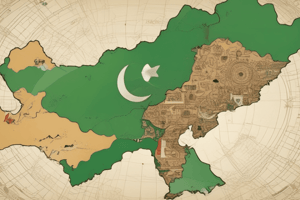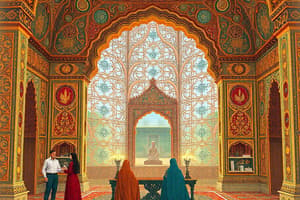Podcast
Questions and Answers
What was the primary influence behind the emergence of Muslim nationalism in the Sub-Continent?
What was the primary influence behind the emergence of Muslim nationalism in the Sub-Continent?
- The establishment of Hindu-majority states
- Foreign invasions from the West
- The introduction of new religious principles through Islam (correct)
- British colonial educational reforms
Which event is considered a significant setback for Indian Muslims, leading to increased calls for a distinct Muslim identity?
Which event is considered a significant setback for Indian Muslims, leading to increased calls for a distinct Muslim identity?
- The founding of the Deen-e-Ilahi movement
- The War of Independence in 1857 (correct)
- The establishment of the Mughal dynasty
- The arrival of Muhammad bin Qasim
Who is recognized for awakening and guiding the Muslim community in the Sub-Continent during the time of colonial challenges?
Who is recognized for awakening and guiding the Muslim community in the Sub-Continent during the time of colonial challenges?
- Ali Hejveri
- Sheikh Ahmad Sirhindi
- Mahmud of Ghazna
- Sir Syed Ahmad Khan (correct)
What role did Sufi saints play in the emergence of the Muslim community in the Sub-Continent?
What role did Sufi saints play in the emergence of the Muslim community in the Sub-Continent?
Which consequence followed the British response to the Indian War of Independence regarding the Muslim population?
Which consequence followed the British response to the Indian War of Independence regarding the Muslim population?
What is a primary function of ideology as described?
What is a primary function of ideology as described?
What realization led to the demand for a separate state in South Asia?
What realization led to the demand for a separate state in South Asia?
Who played a significant role in providing a philosophical explanation for the ideology of Pakistan?
Who played a significant role in providing a philosophical explanation for the ideology of Pakistan?
According to the ideology of Pakistan, what was the basis of Muslim nationhood?
According to the ideology of Pakistan, what was the basis of Muslim nationhood?
What did the Objectives Resolution passed by the Constituent Assembly signify?
What did the Objectives Resolution passed by the Constituent Assembly signify?
Flashcards
Ideology
Ideology
A set of beliefs, values, and ideals that guide a group or nation's actions and worldview. It provides meaning and order, emphasizing certain principles and outlining a vision for the future.
Ideology of Pakistan
Ideology of Pakistan
The ideology of Pakistan emerged through a series of historical events, philosophical discussions, and political actions. The recognition of distinct Muslim and Hindu cultural identities, the need for a separate state, and the eventual establishment of Pakistan through the Objectives Resolution formalized the ideology.
Separate Electorates
Separate Electorates
The Muslims of South Asia demanded separate electorates during British rule, recognizing their distinct cultural and religious identity from the Hindu majority. This demand for a separate state grew when they realized their future in a Hindu-dominated India was uncertain.
Islamic Faith as the basis of Nationhood
Islamic Faith as the basis of Nationhood
Signup and view all the flashcards
Two-Nation Theory
Two-Nation Theory
Signup and view all the flashcards
Muslim Nationalism
Muslim Nationalism
Signup and view all the flashcards
Reaction to Hindu-Muslim Syncretism
Reaction to Hindu-Muslim Syncretism
Signup and view all the flashcards
Sir Syed Ahmad Khan's Role
Sir Syed Ahmad Khan's Role
Signup and view all the flashcards
1857 Rebellion's Impact on Muslim Identity
1857 Rebellion's Impact on Muslim Identity
Signup and view all the flashcards
Study Notes
Lecture 1: Pak301
-
Ideology: A set of beliefs, values, and ideals of a group or nation, deeply ingrained in social consciousness. It provides a framework for action, meaning to life, and a blueprint for the future. It legitimizes/delegitimizes actions and philosophies, giving direction and worldview to the nation.
-
Pakistan's Ideology: Developed through historical experience, philosophical explanations, political reality, and legal sanction (Objectives Resolution, 1949). It stems from Muslims in South Asia feeling distinct from Hindus, potentially due to clash of social orders (culture, traditions, etc). Muslims sought separate state due to perceived danger of Hindu majority.
-
Two-Nation Theory: Muslims in South Asia saw themselves as a distinct nation, not a community, based on Islamic faith and social orders, separate from the existing Hindu society. Distinctions included culture, religion, traditions, and political/historical context. The concept of Muslims as a nation predates Pakistan's establishment.
-
Evolution of Two-Nation Theory: Muslim nationalism emerged with Islam, emphasizing a benign society based on Islamic teachings. This early form developed through interactions, conquests, and conversions. Sufi saints, traders/invaders, and political figures played a role in solidifying a distinct Muslim community in India. Muslim rulers established dynasties. Muslim identity/culture was shaped by the emergence of a community distinct from Hinduism, leading to conflicts like the Hindi-Urdu controversy. British actions (especially the 1857 War of Independence) and Hindu revival movements impacted the development of Muslim nationalism and the demand for a separate state.
-
Hindi-Urdu Controversy: 1867, Hindus' attempt to replace Urdu with Hindi in offices sparked Muslim nationalism. The controversy emphasized Hindu opposition to Urdu (as a Muslim language) as a major point of contention in the rise of separate identity for Muslims. This contributed to the emergence of Muslim nationalism, highlighting the necessity for safeguards for their culture/interests, eventually culminating in the demand for a separate state.
Studying That Suits You
Use AI to generate personalized quizzes and flashcards to suit your learning preferences.




